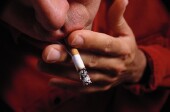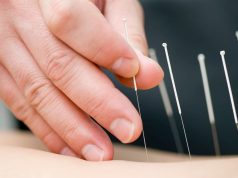Former, as well as current, smokers saw higher risk for radiation tx-related urinary side effects
WEDNESDAY, Jan. 28, 2015 (HealthDay News) — Current smoking reduces odds of survival in prostate cancer, according to a new study published online Jan. 27 in BJU International.
Michael Zelefsky, M.D., vice chair of clinical research in the department of radiation oncology at the Memorial Sloan Kettering Cancer Center in New York City, and colleagues focused on 2,358 patients who underwent treatment for prostate cancer between 1988 and 2005. Nearly 50 percent were identified as “former smokers,” even if they had only stopped smoking shortly before beginning cancer treatment. Disease progression, relapse, symptoms, and deaths were all tracked for an average of eight years, as were all reactions to the radiation treatment.
The researchers determined that the likelihood of surviving prostate cancer for a decade without experiencing any disease recurrence was 66.4 percent among patients who had never smoked. By comparison, that figure fell to 52.4 percent among patients who were current smokers. Former smokers fared better than current smokers, with 62.6 percent projected to hit the 10-year survival mark. But compared with those who had never smoked, both current and former smokers faced a notably higher risk for the toxic urinary side effects that can occur with radiation treatment.
“We’ve long known that smoking increases the chances for developing lung cancer and cardiovascular disease. But this finding suggests that smoking may also undermine the battle against prostate cancer, and perhaps all cancers in general,” Zelefsky told HealthDay. “So, at minimum this should make us more cognizant of the need to get a good smoking history on prostate cancer patients, and [to be] more proactive in terms of referring them for smoking cessation programs, rather than putting the issue on the backburner while undergoing treatment.”
Copyright © 2015 HealthDay. All rights reserved.








